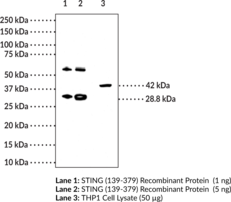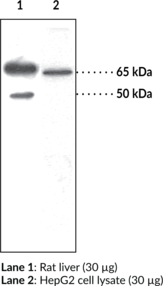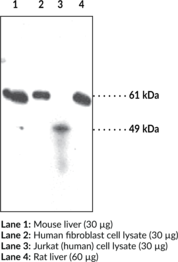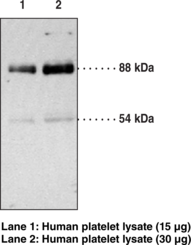Description
Stimulator of Interferon Genes (STING) is a component of the innate immune response. STING binds to cyclic dinucleotides, which are bacterial second messengers.{24607} Recognition of cyclic-di-GMP (c-di-GMP), c-di-AMP, or c-GMP-AMP leads to activation of NF-κB and transcription of immunomodulatory genes, including type I interferon (IFN).{22400,22401,24611} Loss of STING regulation contributes to autoimmune disorders through increased IFN activity.{24608} The gene for STING is mutated in the mouse strain Goldenticket, which consequently lacks a type I IFN response to Listeria infection.{24612} Activation of STING by the flavonoid 5,6-dimethylxanthenone-4-acetic acid (DMXAA; Item No. 14617) has been shown to kill solid tumors in mice, but the binding site of DMXAA is not conserved in human STING.{24610,24609} Cayman’s STING Monoclonal Antibody (Clone 2C8) can be used for ELISA, immunohistochemistry, and Western blot applications. The antibody recognizes STING at 42 kDa from human samples.
Synonyms: Endoplasmic Reticulum Interferon Stimulator|ERIS|Mediator of IRF3 Activation|MITA|MPYS|Stimulator of Interferon Genes|TMEM173|Transmembrane Protein 173
Immunogen: Human recombinant STING protein AA 139-379
Formulation: 100 µg of protein G-purified monoclonal antibody
Isotype: IgG1
Applications: ELISA, IHC, and WB
Origin:
Stability: 365 days
Application|ELISA||Application|Immunohistochemistry||Application|Western Blot||Product Type|Antibodies|Monoclonal Antibodies||Research Area|Cancer||Research Area|Epigenetics, Transcription, & Translation|Transcription Factors||Research Area|Immunology & Inflammation|Autoimmunity||Research Area|Immunology & Inflammation|Innate Immunity|Pattern Recognition||Research Area|Immunology & Inflammation|Innate Immunity|STING||Research Area|Infectious Disease|Bacterial Diseases




